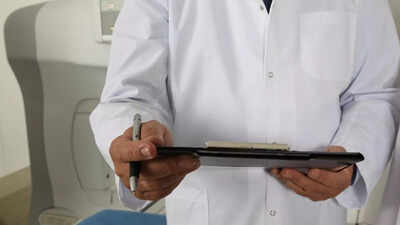Pune: Dengue-linked brain swelling cases are increasing, say experts

Image used for representational purpose only
PUNE: A number of dengue patients are reporting convulsions, along with a drop in blood platelet count, a week after the onset of illness, treating doctors in Pune told TOI on Wednesday.
Brain involvement during dengue, medically known as dengue encephalopathy (brain inflammation or swelling), is a relatively rare neurological complication of dengue fever, which is considered a non-neurotropic disease - a disease that doesn't attack or live in neural tissue.
But doctors said that in recent years - especially during the monsoon months - there has been a steady rise in the number of cases in which dengue impacted the brain.
Specialists have urged treating doctors to maintain a high degree of suspicion whenever patients turn up with "atypical symptoms", including high-grade fever and neurological manifestations such as convulsions.
The experts advised brain scans, if patients presented with alterations in mental state (confusion/disorientation) - called altered sensorium - along with seizures/convulsions and a history of fever.
"Of late, the dengue virus has started manifesting neurological complications more frequently. Although a rare manifestation, encephalopathy (brain inflammation) should be investigated during outbreaks of dengue in the monsoon and post-monsoon months as early diagnosis is essential," critical care expert Dr. Kapil Borawake said, adding that he has seen more than 10 dengue patients with brain involvement in the last few days.
"Patients mostly recover without any brain deficit, if treated in time," he said.
The mortality rate in patients with expanded dengue syndrome, including brain involvement, is over 50% to 60% as it affects multiple vital organs. Patients with underlying medical conditions and those with compromised immunity are more likely to develop expanded dengue syndrome.
Among cases of dengue encephalopathy, incidence of intracerebral bleeding is very rare. However, doctors in Pune have reported patients with a platelet count of less than 20,000 and bleeding inside the brain.
"Dengue virus types 2 and 3 (DENV-2 and DENV-3) are the ones traditionally involved in neurological complications. The virus can affect any part of the nervous system, including the peripheral nervous system (PNS) and eye structures. The major identifiable risk factors contributing to neurological involvement are high-grade fever, thrombocytopenia or low platelet count and liver dysfunction," said Ruby Hall Clinic's physician Dr Abhijeet Lodha.
Critical care specialist Dr Suhas Kalashetti, from the Shree Samarth Hospital, said, "We have seen several patients with expanded dengue syndrome this year. Most had brain inflammation or encephalitis and acute kidney injury or liver dysfunction."
Whenever a patient presents with altered sensorium, a brain scan must be done irrespective of the patient's metabolic profile, including urea and creatinine estimation, Dr Kalashetti added.
At Noble Hospital in the city, infectious diseases specialist Dr Ameet Dravid said, "We have two patients of dengue encephalitis and chikungunya encephalitis currently admitted at our hospital."
Dr Piyush Chaudhari, infectious disease expert with Jehangir Hospital, said cases of dengue encephalopathy are certainly on the rise in Pune.
"Treating doctors need to have an index of suspicion while treating these patients. They usually recover without any brain deficit," Dr Chaudhari said.
Brain involvement during dengue, medically known as dengue encephalopathy (brain inflammation or swelling), is a relatively rare neurological complication of dengue fever, which is considered a non-neurotropic disease - a disease that doesn't attack or live in neural tissue.
But doctors said that in recent years - especially during the monsoon months - there has been a steady rise in the number of cases in which dengue impacted the brain.
Specialists have urged treating doctors to maintain a high degree of suspicion whenever patients turn up with "atypical symptoms", including high-grade fever and neurological manifestations such as convulsions.
The experts advised brain scans, if patients presented with alterations in mental state (confusion/disorientation) - called altered sensorium - along with seizures/convulsions and a history of fever.
"Of late, the dengue virus has started manifesting neurological complications more frequently. Although a rare manifestation, encephalopathy (brain inflammation) should be investigated during outbreaks of dengue in the monsoon and post-monsoon months as early diagnosis is essential," critical care expert Dr. Kapil Borawake said, adding that he has seen more than 10 dengue patients with brain involvement in the last few days.
"Patients mostly recover without any brain deficit, if treated in time," he said.
The mortality rate in patients with expanded dengue syndrome, including brain involvement, is over 50% to 60% as it affects multiple vital organs. Patients with underlying medical conditions and those with compromised immunity are more likely to develop expanded dengue syndrome.
Among cases of dengue encephalopathy, incidence of intracerebral bleeding is very rare. However, doctors in Pune have reported patients with a platelet count of less than 20,000 and bleeding inside the brain.
"Dengue virus types 2 and 3 (DENV-2 and DENV-3) are the ones traditionally involved in neurological complications. The virus can affect any part of the nervous system, including the peripheral nervous system (PNS) and eye structures. The major identifiable risk factors contributing to neurological involvement are high-grade fever, thrombocytopenia or low platelet count and liver dysfunction," said Ruby Hall Clinic's physician Dr Abhijeet Lodha.
Critical care specialist Dr Suhas Kalashetti, from the Shree Samarth Hospital, said, "We have seen several patients with expanded dengue syndrome this year. Most had brain inflammation or encephalitis and acute kidney injury or liver dysfunction."
Whenever a patient presents with altered sensorium, a brain scan must be done irrespective of the patient's metabolic profile, including urea and creatinine estimation, Dr Kalashetti added.
At Noble Hospital in the city, infectious diseases specialist Dr Ameet Dravid said, "We have two patients of dengue encephalitis and chikungunya encephalitis currently admitted at our hospital."
Dr Piyush Chaudhari, infectious disease expert with Jehangir Hospital, said cases of dengue encephalopathy are certainly on the rise in Pune.
"Treating doctors need to have an index of suspicion while treating these patients. They usually recover without any brain deficit," Dr Chaudhari said.
FOLLOW US ON SOCIAL MEDIA
FacebookTwitterInstagramKOO APPYOUTUBE
Start a Conversation
end of article










